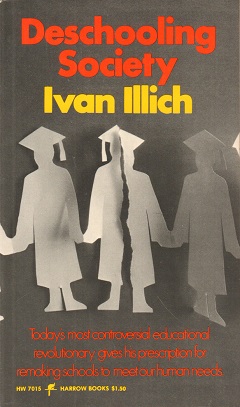
Deschooling society
Ivan Illich
The pupil is thereby schooled to confuse teaching with learning, grade advancement with education, a diploma with competence, and fluency with the ability to say something new.
Neither learning nor justice is promoted by schooling because educators insist on packaging instruction with certification. Learning and the assignment of social roles are melted into schooling. [...] Universal schooling was meant to detach role assignment from personal life history: it was meant to give everybody an equal chance to any office.[...] However, instead of equalizing chances, the school system has monopolized their distribution.
A second major illusion on which the school system rests is that most learning is the result of teaching. Teaching, it is true, may contribute to certain kinds of learning under certain circumstances. But most people acquire most of their knowledge outside school, and in school only insofar as school, in a few rich countries, has become their place of confinement during an increasing part of their lives.
School is inefficient in skill instruction especially because it is curricular. In most schools a program which is meant to improve one skill is chained always to another irrelevant task.
A deschooled society implies a new approach to incidental or informal education. Contemporary society is the result of conscious designs, and educational opportunities must be designed into them. Our reliance on specialized, full-time instruction through school will now decrease, and we must find more ways to learn and teach: the educational quality of all institutions must increase again.
Everywhere, all children know that they were given a chance, albeit an unequal one, in an obligatory lottery, and the presumed equality of the international standard now compounds their original poverty with the self-inflicted discrimination accepted by the dropout. They have been schooled to the belief in rising expectations and can now rationalize their growing frustration outside school by accepting their rejection from scholastic grace. They are excluded from Heaven because, once baptized, they did not go to church.
At the opposite extreme of the spectrum lie institutions distinguished by spontaneous use-the "convivial" institutions. Telephone link-ups, subway lines, mail routes, public markets and exchanges do not require hard or soft sells to induce their clients to use them. Sewage systems, drinking water, parks, and sidewalks are institutions men use without having to be institutionally convinced that it is to their advantage to do so.
The highway system is a network for locomotion across relatively large distances. As a network, it appears to belong on the left of the institutional spectrum. But here we must make a distinction which will clarify both the nature of highways and the nature of true public utilities. Genuinely all-purpose roads are true public utilities. Superhighways are private preserves, the cost of which has been partially foisted upon the public.
The value of a man's schooling is a function of the number of years he has completed and of the costliness of the schools he has attended.
The man-made environment has become as inscrutable as nature is for the primitive.